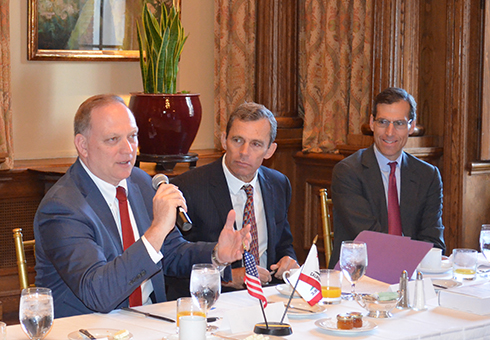
William Parker (far left)
William Parker, the COO of the EastWest Institute, said there are five main threats to national security: the mounting national debt, political hyper-partisanship, a worldwide refugee crisis, terrorists with access to weapons of mass destruction, and a group of state actors who bear some hostility to the US. All of these threats need urgent attention from the Trump administration, said Parker, a former Navy officer whose job now at the East West Institute is focused on conflict prevention around the world.
On the national debt, Parker said that it was currently at $19 trillion, which is a sum that could otherwise pay for 1,000 new aircraft carriers - and that debt is continuing to increase. He said that political partisanship was making it very difficult for the government to operate, and the increase in refugees - at a rate of 24 new displaced people every minute - was further adding to international tensions - notably in Europe.
He pointed to an ever-present danger of terrorists getting hold of weapons of mass destruction - particularly biological weapons. As for ISIS, he said "I think there are some people in this world who need to be killed," while conceding that "you cannot kill yourself out of this problem - there will always be another group springing up."
As for state actors, he said Russia, China, Iran and North Korea were our main potential adversaries - with Pyongyang presenting the most immediate threat. "To have a little guy with a bad haircut have nuclear weapons is just a bad idea." Parker pointed out that Pyongyang was rushing to build ballistic missiles, and was also developing a submarine fleet that could launch missiles "from our back door". He said the US should "remove their technology" - either by means of a cyber attack, or by a kinetic strike.
On Russia, he said, we made a mistake by not resisting their invasion of eastern Ukraine more strenuously - "We drew a line, they stepped over and we allowed them to keep moving. We can't let them do this in the future." We have a problem communicating with Russia right now. "We don't have enough counterparts in Russia, and it's both of our faults." Chinese conversations are happening daily.
China has been going through an unprecedented military expansion over the past 20 years, with military spending increasing at an average rate of 10% a year. He said that in the South China Sea the Chinese were pushing forwards very aggressively. "Allowing people to grab islands and put weapons there is dangerous." He said there was an urgent need to "define the rules of the road for maritime movement" in the S China Sea. He said the US should also try to involve China in the campaign against N Korea's nuclear program.
"We are beyond the point of no return. This guy is a bit of a wackadoodle. Not if but when is he going to pull the trigger."
"The THAAD system (Theater High Altitude Area Defense - a system of anti-missile missiles which the US is installing in S Korea) by itself will not defeat North Korea if they send in everything they have but it's a good start." At least, said Parker, THAAD shows a demonstration of what some of the other weapons systems that the US could deploy.
On Iran, he said "It's absolutely critical that we have an ongoing discussion with the Iranians. Iran is a perfect example of a country that is ripe to come back into the fold of the rest of the world. The population is intelligent, pro-West, not into the insanity of others in the area. Iran is a country that can be brought around. Their military is very professional. If the people of Iran say 'we're ready to take our country back', they will. They're not weak like we thought."
